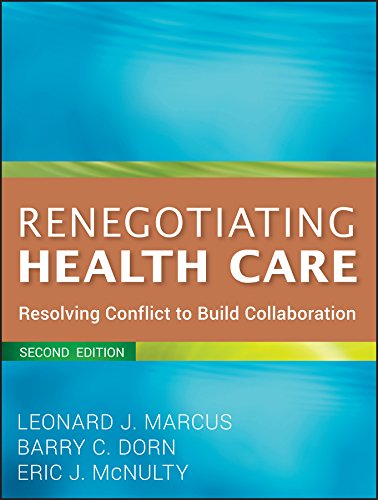Renegotiating Health Care: Resolving Conflict to Build Collaboration / Marcus, Leonard J.
| List Price: | |
Our Price: $86.75 | |
|
For Bulk orders
| |
|
Used Book Price: | |
| Renegotiating Health Care: Resolving Conflict to Build Collaboration / Marcus, Leonard J. | |
| Publisher: Jossey-Bass | |
| Availability:In Stock. | |
| Sales Rank: 787641 | |
|
Q&A with the Authors of Renegotiating Health Care: Resolving Conflict to Build Collaboration
What do you mean by “renegotiating” health care?
For many decades, health care was a relatively predictable experience for patients, doctors, nurses, administrators, insurers, and policy makers. For the past 20 years it has been changing more rapidly and more radically – and the intensity change is increasing. The push to lower costs and improve quality, the shortage of doctors and nurses, and the increasing sophistication of patients are among the trends calling much in the system that we’ve taken for granted into question. With that comes the potential both for conflit and collaboration – every stakeholder in the system will benefit from knowing how to negotiate and resolve conflict constructively.
What are some of those major trends and what are the implications?
One of the most significant is the expanding use of technology. Technology has long been important in delivering treatment; it is becoming much more important in managing the system. For example, there is a growing move to make evidence-driven treatment protocols the default option for many conditions. Doctors are used to exercising their own discretion in choosing what is best for their patients and some resist the loss of control. Patients now have ready access to many digital resources that allow them to look clinical studies, converse with other patients, and peruse performance and cost data. Administrators and insurers have ever-more detailed information on utilization rates, revenue and cost flows, and outcomes. Each of these shifts the power balance in the system and can cause conflict.
Other trends are the aging of population and increased diversity in the workforce. If people have the tools to navigate these changes in a positive way, the system can function more productively. If not, everyone will feel the pain.
What is distinct about your approach to negotiation and conflict resolution?
We have been teaching negotiation and conflict resolution to students, through our work at the Harvard School of Public Health, and to professionals in a consulting role for more than two decades. Over that time we have developed a series of practical, proven concepts and tools that can be used in everyday situations in healthcare. For too many people, their negotiation “training” has come in the context of buying a car or a house – a unidimensional, often confrontational setting. The issues one finds in healthcare are typically multidimensional and confrontational negotiation doesn’t solve the problem. It often compounds it. We have found that when people have a process for multi-dimensional problem solving that they can understand and readily deploy, they approach conflict and negotiation with a different, more hopeful mindset. They seek win-win outcomes rather than trying to “beat” the other party.
One of tools we offer in the book is called “The Walk in the Woods.” It is a four-step process for reframing conflict so that new possibilities – distinct from what either party started the negotiation thinking of as a “win” – can emerge through collaboration. It can be used in a 20-minute performance review or a major policy debate. In fact, we wish Congress and the President had used it when they were debating health care reform. The process might have been less acrimonious and the parties would not have ended the process with such bitterness about the outcome.
In the book you write about leadership. How is this connected to negotiation and conflict resolution?
Many of the people who read this book will be leaders or would-be leaders in some part of the health care system. We believe that negotiation is a critical leadership skill. One hospital CEO we interviewed for the book noted that every interaction between two or more people for which there is a desired outcome is, in effect, a negotiation. Leaders have many, many such interactions each and every day. They have to be able to negotiate and resolve conflict if they are to be effective.
We present a framework we call meta-leadership that is based on observing leaders in high stress, high stakes situations – many when lives were at stake. It addresses the challenges not only of leading one’s subordinates, the focus of most leadership models, but also in leading up to one’s boss and across to one’s peers and external stakeholders such as regulators and communities. It is a 360-degree approach to leadership that we feel reflects the reality that many in health care face.
Now you can buy Books online in USA,UK, India and more than 100 countries.
*Terms and Conditions apply
Disclaimer: All product data on this page belongs to
 .
.No guarantees are made as to accuracy of prices and information.










